人教新目标(Go for it)版七年级下Unit 4 Don't eat in class. Section A 1a-2c课件(37张ppt)
文档属性
| 名称 | 人教新目标(Go for it)版七年级下Unit 4 Don't eat in class. Section A 1a-2c课件(37张ppt) | 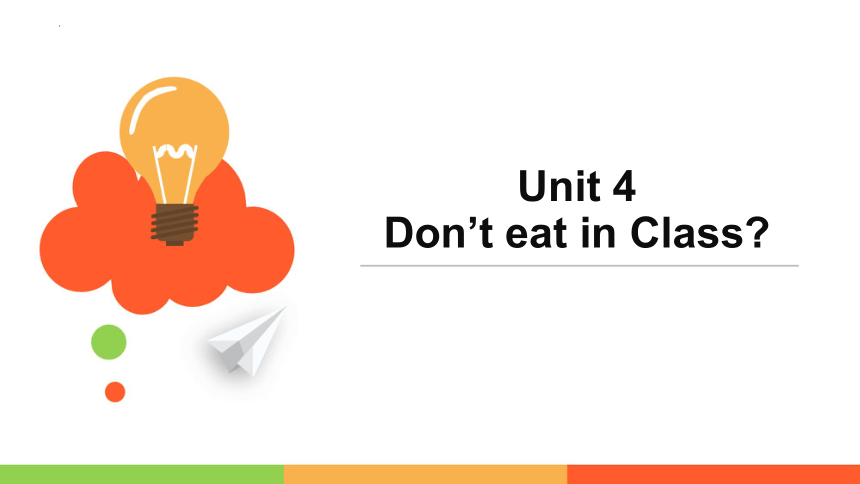 | |
| 格式 | zip | ||
| 文件大小 | 4.0MB | ||
| 资源类型 | 教案 | ||
| 版本资源 | 人教新目标(Go for it)版 | ||
| 科目 | 英语 | ||
| 更新时间 | 2022-03-04 21:08:40 | ||
图片预览

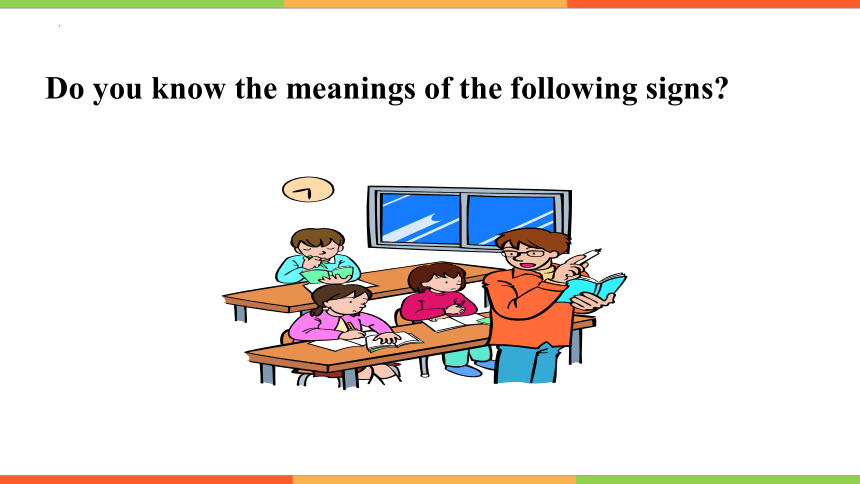
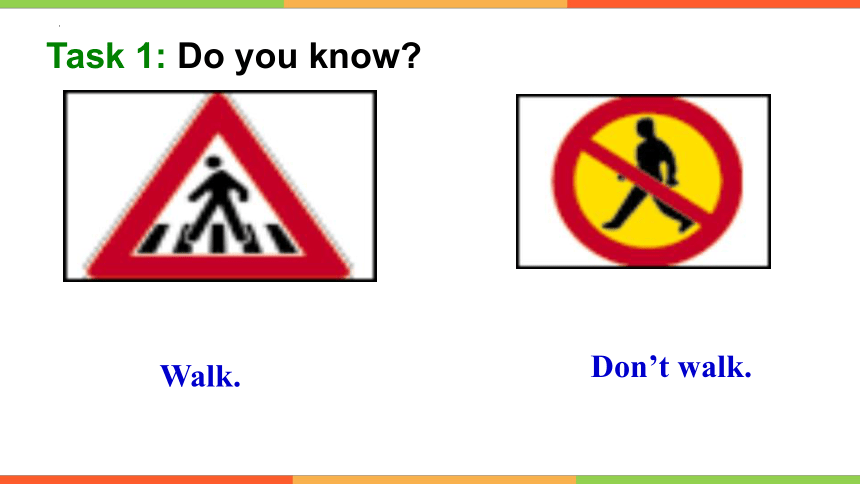
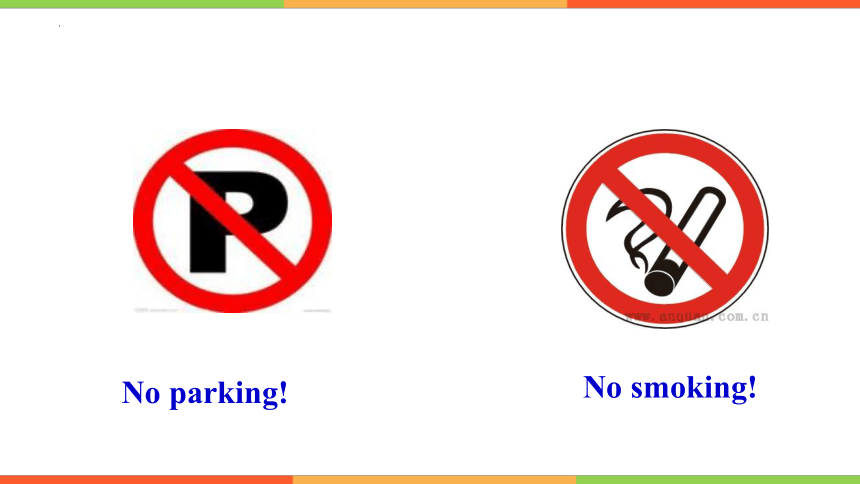
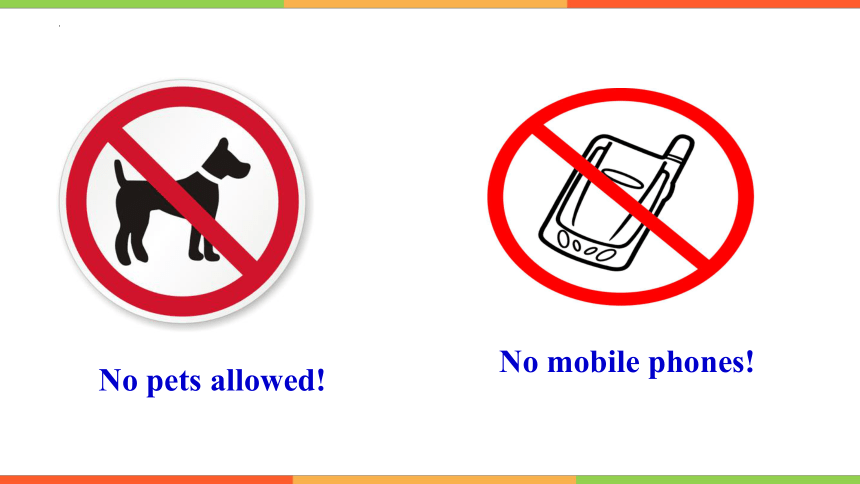
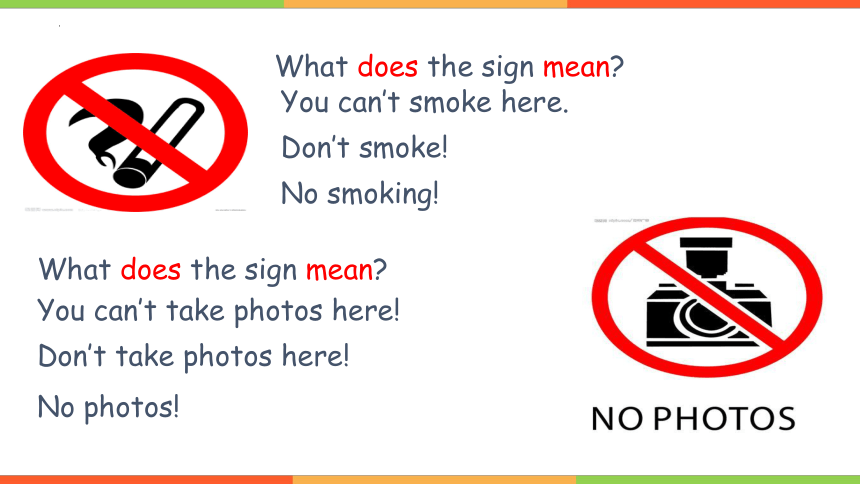
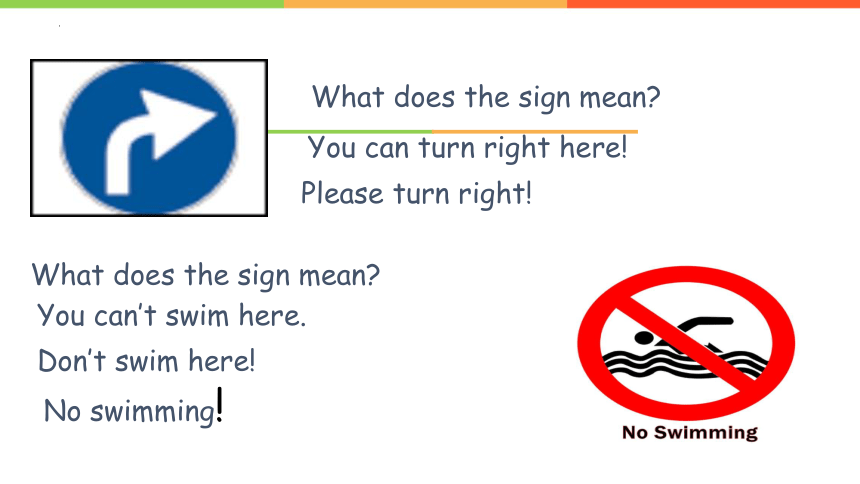
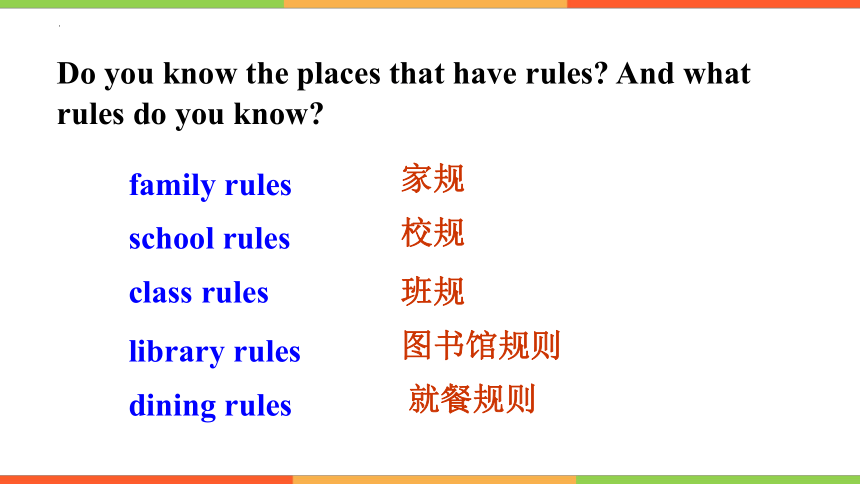
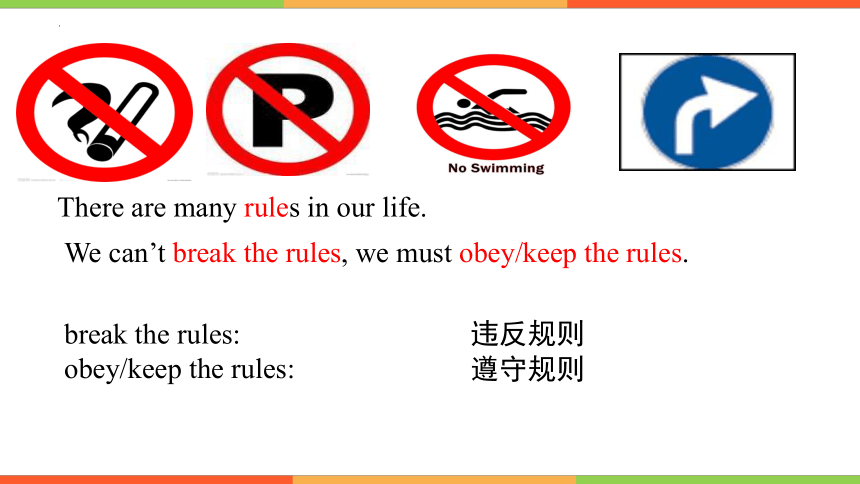
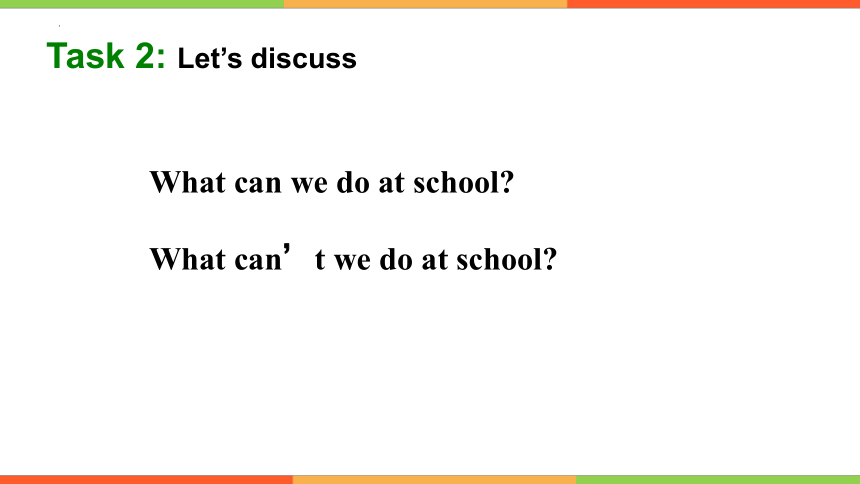
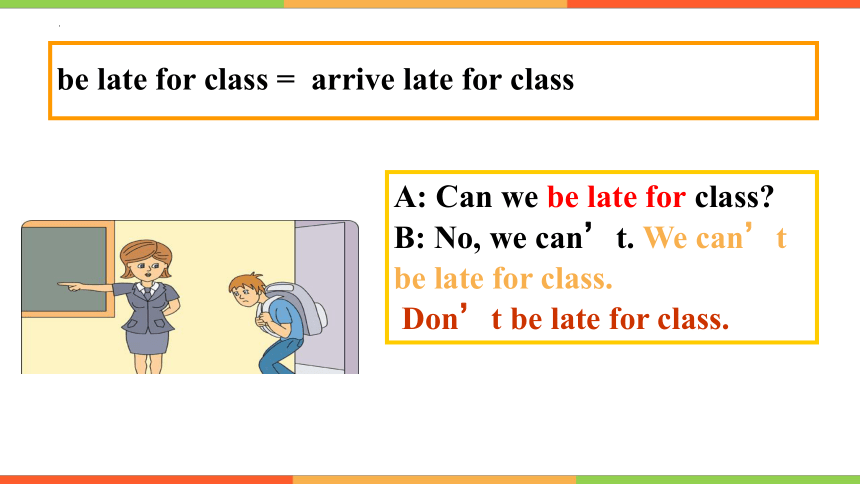
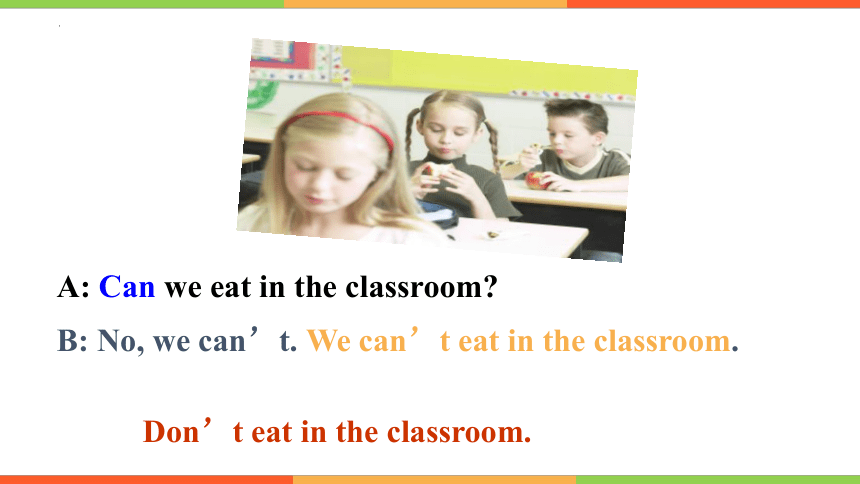
文档简介
(共37张PPT)
Unit 4
Don’t eat in Class
Do you know the meanings of the following signs
Walk.
Don’t walk.
Task 1: Do you know
No parking!
No smoking!
No pets allowed!
No mobile phones!
Don’t smoke!
No smoking!
What does the sign mean
You can’t smoke here.
You can’t take photos here!
No photos!
What does the sign mean
Don’t take photos here!
You can turn right here!
Please turn right!
What does the sign mean
What does the sign mean
You can’t swim here.
Don’t swim here!
No swimming!
Do you know the places that have rules And what rules do you know
school rules
class rules
family rules
library rules
dining rules
校规
班规
图书馆规则
就餐规则
家规
There are many rules in our life.
We can’t break the rules, we must obey/keep the rules.
break the rules:
obey/keep the rules:
违反规则
遵守规则
What can we do at school
What can’t we do at school
Task 2: Let’s discuss
be late for class = arrive late for class
A: Can we be late for class
B: No, we can’t. We can’t be late for class.
Don’t be late for class.
Don’t eat in the classroom.
A: Can we eat in the classroom
B: No, we can’t. We can’t eat in the classroom.
We can eat in the dining hall.
A: Can we eat in the dining hall
B: Yes, we can eat in the dining hall.
2
3
4
5
1
School Rules
Don’t arrive late for class. You must be on time.
Don’t run in the hallways.
Don’t eat in the classroom. You must eat in the dining hall.
Don’t listen to music in class.
Don’t fight.
Task 3: Which rules are these students breaking Write the number of the rule next to the student
Peter _____
Amy _____
Mike _____
Listen. What rules are these students breaking Write the
numbers after the names.
2
3
4
2
3
4
What are the rules
We can’t arrive late for class.
Don’t arrive late for class.
We can’t eat in the classrooms.
Don’t eat in the classrooms.
What are the rules
We can’t listen to music in the classrooms.
Don’t listen to music in the classrooms.
We can’t fight.
Don’t fight.
Well, we can’t arrive late for class. We must be on time.
Student A is a new student. Student B tells Student A about the rules above.
What are the rules
Don’t run in the hallways.
Task 4: Pair work
Don’t eat in the classroom
You must eat in the dining hall.
What are the other rules
Don’t listen to
music in class.
Don’t fight.
Activity
1.___ listen to music in the classroom or hallways can can’t
2.___ listen to music in the music room can can’t
3.___ listen to music outside can can’t
4.___ eat in the classroom can can’t
Task 5: Listen. Check (√) the activities Alan and Cindy talk about.
5.___ eat in the dining hall can can’t
6.___ eat outside can can’t
7.___ wear a hat can can’t
8.___ fight can can’t
Activity
1.___ listen to music in the classroom or hallways can can’t
2.___ listen to music in the music room can can’t
3.___ listen to music outside can can’t
4.___ eat in the classroom can can’t
Listen again. Can Alan and Cindy do these activities Circle can or can’t above.
5.___ eat in the dining hall can can’t
6.___ eat outside can can’t
7.___ wear a hat can can’t
8.___ fight can can’t
Task 6: Role play the conversation !
Read the conversation and answer the questions!
1. Is John new at school
2. Are there many rules at school
3. Can he bring music player to school
4. Do they have to wear school uniform
Yes , he is.
Yes , there are.
No, he can’t.
Yes, they do.
1) arrive 后面可以不跟到达的地点。
Don’t arrive late for school. 不要上学迟到。
2) arrive后面也可以跟到达的地点。但后面必须要跟介词in (大地方)或 at(小地方)。
1. arrive 到达= get (to)
Language points
They arrived in Beijing at six.
We usually arrive at the village in the morning.
1. My mother usually get ___ school at 7:40 in the morning.
2. When do you usually arrive ____ the bus station
3. Jenny’s uncle usually arrives ___ Shanghai in the evening.
选词填空: in, at, to
to
in
at
1) listen 听;用来提醒某人注意,后面不跟事物。
Listen! Who’s singing in the classroom
2) 如果后面跟要听的事物,应跟介词to再跟事物。
Listen to our teacher carefully.
2. listen 的用法;
3. fight 打架,争吵
1) 作动词用
Jack never fights with his brother.
2) 作名词,意为“打架;争吵”; 常用词组have a fight“打架;吵架”
Did you have a fight with her
4. wear 意为“穿、戴”
My aunt wears a blue skirt and a white T-shirt.
Does he wear glasses
wear强调“穿着”这一状态,也可表示“戴着”。如:
She likes wearing colorful clothes.
dress既可表示动作,又可表示状态,常由人作宾语,意为“给……穿衣服”。
Could you dress the child for me
wear, dress 与 put on的区别
当表示自己穿衣服时,一般用get dressed (= dress oneself)。 如:
He cannot get dressed( = dress himself).
当dress表示状态时,一般要用be dressed in的形式。如:
She is dressed in a red coat.
put on着重于“穿”这一动作,即由没穿到穿这一过程的完成,意为“穿上”。如:
Please put on your new coat.
用 wear, put on, dress 的适当形式填空。
1. She is _________ a red flower in her hair.
2. He ________ his coat and goes out.
3. He is _________ black.
wearing
puts on
dressed in
5. have to与must
1) have to意为“必须做某事”强调“客观需要”
They have to wear school uniforms every day.
2) must 意为“必须”强调主观上的愿望
It’s late. I must go home now.
练一练:用have to, must 填空
1. It’s cold outside. We ________ stay at home.
2. We ______ be good with our parents.
have to
must
祈使句
1.祈使句是表示命令、叮嘱、号召等的句子;
2.通常省略主语you;
3.句中谓语动词用动词原形;
4.祈使句有肯定和否定两种:
Don’t eat in class.
Don’t play sports in the classroom.
Don’t fight.
Come in, please!
Sit down, please.
否定
肯定
肯定祈使句 否定祈使句
Sit down.
Come in.
Eat at home.
Listen to music outside.
5. Do your homework at school.
Don’t sit down.
Don’t come in .
Don’t eat at home.
Don’t listen to music outside.
Don’t do your homework at school.
Examples
Thank you !
Unit 4
Don’t eat in Class
Do you know the meanings of the following signs
Walk.
Don’t walk.
Task 1: Do you know
No parking!
No smoking!
No pets allowed!
No mobile phones!
Don’t smoke!
No smoking!
What does the sign mean
You can’t smoke here.
You can’t take photos here!
No photos!
What does the sign mean
Don’t take photos here!
You can turn right here!
Please turn right!
What does the sign mean
What does the sign mean
You can’t swim here.
Don’t swim here!
No swimming!
Do you know the places that have rules And what rules do you know
school rules
class rules
family rules
library rules
dining rules
校规
班规
图书馆规则
就餐规则
家规
There are many rules in our life.
We can’t break the rules, we must obey/keep the rules.
break the rules:
obey/keep the rules:
违反规则
遵守规则
What can we do at school
What can’t we do at school
Task 2: Let’s discuss
be late for class = arrive late for class
A: Can we be late for class
B: No, we can’t. We can’t be late for class.
Don’t be late for class.
Don’t eat in the classroom.
A: Can we eat in the classroom
B: No, we can’t. We can’t eat in the classroom.
We can eat in the dining hall.
A: Can we eat in the dining hall
B: Yes, we can eat in the dining hall.
2
3
4
5
1
School Rules
Don’t arrive late for class. You must be on time.
Don’t run in the hallways.
Don’t eat in the classroom. You must eat in the dining hall.
Don’t listen to music in class.
Don’t fight.
Task 3: Which rules are these students breaking Write the number of the rule next to the student
Peter _____
Amy _____
Mike _____
Listen. What rules are these students breaking Write the
numbers after the names.
2
3
4
2
3
4
What are the rules
We can’t arrive late for class.
Don’t arrive late for class.
We can’t eat in the classrooms.
Don’t eat in the classrooms.
What are the rules
We can’t listen to music in the classrooms.
Don’t listen to music in the classrooms.
We can’t fight.
Don’t fight.
Well, we can’t arrive late for class. We must be on time.
Student A is a new student. Student B tells Student A about the rules above.
What are the rules
Don’t run in the hallways.
Task 4: Pair work
Don’t eat in the classroom
You must eat in the dining hall.
What are the other rules
Don’t listen to
music in class.
Don’t fight.
Activity
1.___ listen to music in the classroom or hallways can can’t
2.___ listen to music in the music room can can’t
3.___ listen to music outside can can’t
4.___ eat in the classroom can can’t
Task 5: Listen. Check (√) the activities Alan and Cindy talk about.
5.___ eat in the dining hall can can’t
6.___ eat outside can can’t
7.___ wear a hat can can’t
8.___ fight can can’t
Activity
1.___ listen to music in the classroom or hallways can can’t
2.___ listen to music in the music room can can’t
3.___ listen to music outside can can’t
4.___ eat in the classroom can can’t
Listen again. Can Alan and Cindy do these activities Circle can or can’t above.
5.___ eat in the dining hall can can’t
6.___ eat outside can can’t
7.___ wear a hat can can’t
8.___ fight can can’t
Task 6: Role play the conversation !
Read the conversation and answer the questions!
1. Is John new at school
2. Are there many rules at school
3. Can he bring music player to school
4. Do they have to wear school uniform
Yes , he is.
Yes , there are.
No, he can’t.
Yes, they do.
1) arrive 后面可以不跟到达的地点。
Don’t arrive late for school. 不要上学迟到。
2) arrive后面也可以跟到达的地点。但后面必须要跟介词in (大地方)或 at(小地方)。
1. arrive 到达= get (to)
Language points
They arrived in Beijing at six.
We usually arrive at the village in the morning.
1. My mother usually get ___ school at 7:40 in the morning.
2. When do you usually arrive ____ the bus station
3. Jenny’s uncle usually arrives ___ Shanghai in the evening.
选词填空: in, at, to
to
in
at
1) listen 听;用来提醒某人注意,后面不跟事物。
Listen! Who’s singing in the classroom
2) 如果后面跟要听的事物,应跟介词to再跟事物。
Listen to our teacher carefully.
2. listen 的用法;
3. fight 打架,争吵
1) 作动词用
Jack never fights with his brother.
2) 作名词,意为“打架;争吵”; 常用词组have a fight“打架;吵架”
Did you have a fight with her
4. wear 意为“穿、戴”
My aunt wears a blue skirt and a white T-shirt.
Does he wear glasses
wear强调“穿着”这一状态,也可表示“戴着”。如:
She likes wearing colorful clothes.
dress既可表示动作,又可表示状态,常由人作宾语,意为“给……穿衣服”。
Could you dress the child for me
wear, dress 与 put on的区别
当表示自己穿衣服时,一般用get dressed (= dress oneself)。 如:
He cannot get dressed( = dress himself).
当dress表示状态时,一般要用be dressed in的形式。如:
She is dressed in a red coat.
put on着重于“穿”这一动作,即由没穿到穿这一过程的完成,意为“穿上”。如:
Please put on your new coat.
用 wear, put on, dress 的适当形式填空。
1. She is _________ a red flower in her hair.
2. He ________ his coat and goes out.
3. He is _________ black.
wearing
puts on
dressed in
5. have to与must
1) have to意为“必须做某事”强调“客观需要”
They have to wear school uniforms every day.
2) must 意为“必须”强调主观上的愿望
It’s late. I must go home now.
练一练:用have to, must 填空
1. It’s cold outside. We ________ stay at home.
2. We ______ be good with our parents.
have to
must
祈使句
1.祈使句是表示命令、叮嘱、号召等的句子;
2.通常省略主语you;
3.句中谓语动词用动词原形;
4.祈使句有肯定和否定两种:
Don’t eat in class.
Don’t play sports in the classroom.
Don’t fight.
Come in, please!
Sit down, please.
否定
肯定
肯定祈使句 否定祈使句
Sit down.
Come in.
Eat at home.
Listen to music outside.
5. Do your homework at school.
Don’t sit down.
Don’t come in .
Don’t eat at home.
Don’t listen to music outside.
Don’t do your homework at school.
Examples
Thank you !
同课章节目录
- Unit 1 Can you play the guitar?
- Section A
- Section B
- Unit 2 What time do you go to school?
- Section A
- Section B
- Unit 3 How do you get to school?
- Section A
- Section B
- Unit 4 Don't eat in class.
- Section A
- Section B
- Unit 5 Why do you like pandas?
- Section A
- Section B
- Unit 6 I'm watching TV.
- Section A
- Section B
- Review of Units 1-6
- Unit 7 It's raining!
- Section A
- Section B
- Unit 8 Is there a post office near here?
- Section A
- Section B
- Unit 9 What does he look like?
- Section A
- Section B
- Unit 10 I'd like some noodles.
- Section A
- Section B
- Unit 11 How was your school trip?
- Section A
- Section B
- Unit 12 What did you do last weekend?
- Section A
- Section B
